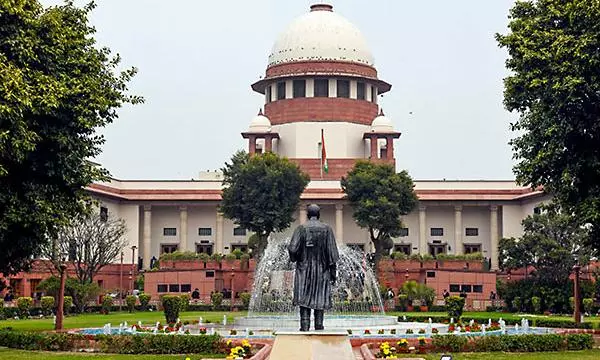
Commercial vs free speech: 5 key points made by SC in comedians’ case
SC directs Centre to frame guidelines for social media platforms to curb speeches that offend or ridicule disabled persons, women, children, senior citizens

During the hearing of a petition by Cure SMA Foundation of India against comedians like Samay Raina on Monday (August 25), the Supreme Court made the distinction that commercial and prohibited speeches are not covered under the fundamental right to free speech.
The court made several key observations in the case concerning comedians and free speech, particularly in the context of jokes made about persons with disabilities.
A bench of Justices Surya Kant and Joymalya Bagchi asked five social media influencers, including India's Got Latent host Samay Raina, to display their unconditional apology in their podcasts or shows for ridiculing persons with disabilities and rare genetic disorders.
The court's remarks focussed on the distinction between personal and commercial speech, the limits of humour, and the need for regulations.
1. Commercial speech vs free speech
The court observed that the freedom of speech and expression guaranteed by Article 19(1)(a) of the Constitution does not apply to commercial speech in the same way.
It noted that when a comedian or influencer monetises their content, their speech becomes a commercial activity. In such cases, they lose the right to use a community to hurt sentiments.
Also Read: Don’t mock the disabled for laughs, publish apology, SC tells comedians
Justice Bagchi said the influencers should be more cautious while creating humour related to different communities especially when it pertains to "apartheid in the society".
"Much of this media block is used like feeding your own ego. It feeds on yourself and when you become too big and have so many followers… It's not only freedom of speech here. It is purely commerce….in fact, there are various kinds of speeches and in the Amish Devgan case, this court has classified various kinds of speeches like commercial speech and prohibited speech. This overlap of commercial and prohibited speeches is where you have no fundamental rights," Justice Bagchi said.
2. Humour cannot breach sensibility
The bench stated that while humour is a well-accepted part of life and people can laugh at themselves, it becomes problematic when it is used to "laugh at others and create a breach of sensibility" on a community level.
The Court emphasised that there must be a balance between the right to free expression and “the duty to not harm others”.
Also Read: ‘Implead…then we’ll see’: SC ‘disturbed’ by Samay Raina’s jokes
3. Dignity overrides free speech
A central observation of the court was that Article 19 (freedom of speech) cannot overpower Article 21 (right to life and dignity).
The court affirmed that the dignity and rights of persons with disabilities, along with other vulnerable groups, must be protected.
4. Need for social media guidelines
The Supreme Court directed the Centre to frame guidelines for social media platforms to curb speeches that offend or ridicule disabled persons, women, children, and senior citizens.
The Court cautioned that these guidelines should not be a "knee-jerk reaction" but a well-thought-out policy based on broad parameters and stakeholder views.
Also Read: Tearful Samay Raina reacts to India's Got Latent row, 'time is bad for me'
The bench allowed the intervention of the Ministry of Information and Broadcasting and asked Attorney General R Venkataramani to come up with guidelines to regulate the content on social media while taking into account the views of all stakeholders.
Venkataramani said the government was in the process of formulating the guidelines but ruled out any "gag order".
Justice Kant agreed and said that was the reason behind the suggestion in the last hearing that draft guidelines will be shared in the public domain for the views of all stakeholders.
5. Apology must be commensurate
The court noted that while the comedians had expressed regret, the apology must be proportional to the harm caused.
Justice Surya Kant remarked that "the degree of repentance should be higher than the degree of offending", likening it to purging contempt of court. The court also asked the comedians to use their platforms to spread awareness about disability rights.
The top court also pulled up Raina for the affidavit enclosing his apology and said he initially tried to defend himself and tried to look innocent.
Also Read: SC summons Samay Raina, influencers to court for 'ridiculing' disabled people
The court called the influencers' conduct "damaging and demoralising" and called for "serious remedial and punitive action" to stop any recurrence of such incidents.
While Justice Kant said there should be penal action under the rules which should be proportionate to the harm caused to the dignity of people, senior advocate Aparajita Singh, appearing for NGO Cure SMA Foundation of India, suggested that influencers should spread awareness on the rare genetic disorder and disabilities through their shows.
(With agency inputs)

